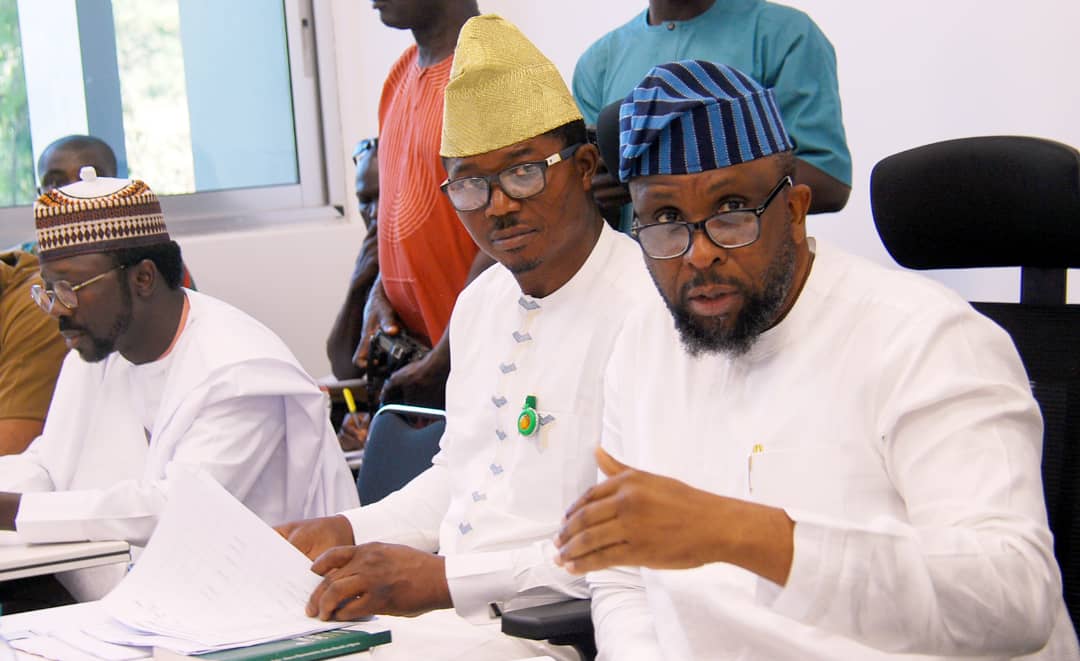News
Boundary disputes responsible for insecurity in coastal states – Oborevwori

Delta State Governor, Sheriff Oborevwori of Delta has said that boundary disputes were also responsible for the rising spate of insecurity, deaths, violence and retarded progress in the country.
The governor stated this while addressing an audience at a one-day workshop for the creation of a platform for Nigeria’s coastal states and local government areas, held at the Government House, Asaba.
The workshop has the theme, “Towards a Secure, Peaceful and Prosperous Borders,” the News Agency of Nigeria reports.
There are many crises in the country over border issues, with Delta State having its fair share.
The boundary crisis between the Okuama community in the Ughelli South Local Government Area and the Okoloba community in the Bomadi Local Government Area, which had claimed many lives, is being resolved by the government.
Speaking at the workshop, the governor said so many lives had been lost to boundary disputes as he called on the National Boundary Commission and other stakeholders to work assiduously in resolving such disputes in the country.
He described the theme as apt, adding that boundary dispute was an ancient and modern disease of humanity.
He said right from the colonial days, Nigeria had been plagued by boundary disputes, which had disastrous and destabilising consequences for the people.
“There is scarcely any state in Nigeria that has not been involved in a boundary dispute with its neighbours, which often results in displacement, death, and destruction.
“Reports indicate that between January 2018 and August 2022; 676 people were killed in various communal and boundary clashes in Nigeria.
“The causes of these disputes are traceable to land ownership, community pride, ancient or colonial boundaries, and socio-cultural factors.
“In Delta State, it is safe to say that at least 80 per cent of boundary disputes revolve around land use, either for farming, mining, and other purposes of economic significance.
“The resultant clashes often leave in their trail a chunk of internally displaced persons with the implication this has for their safety and wellbeing.
“As we all know, the living conditions in IDP camps are unsanitary and inevitably constitute environmental hazards,” he said.
Oborevwori charged the National Boundary Commission to work harder in resolving boundary disputes across the country.
“As the body responsible for resolving boundary disputes in Nigeria, the National Boundary Commission is critical to the peace, security, and prosperity of our communities.
“It is incumbent on it to embark on enlightenment and sensitisation programmes to educate the people on the importance of respecting boundaries.
“It must also properly investigate cases of boundary disputes. In discharging this vital responsibility, officials of the Commission must demonstrate the highest levels of objectivity, neutrality, and integrity to instil confidence and elicit the goodwill of the people.
“Conversations break down fast once there is a perception of favouritism or nepotism on the part of those who are supposed to be impartial arbiters,” he said.
He added, “It goes without saying that an effective conflict resolution mechanism is critical for maintaining national security.
“Hence, there is a need for strong political will on the part of the government to implement recommendations that will resolve disputes amicably, and prevent future border disputes.
“With enhanced peace and security at the core of our MORE agenda, we are committed to partnering with the Commission to discharge its functions effectively for a secure, peaceful, and prosperous Nigeria.”
In his welcome remarks, the Deputy Governor, Monday Onyeme, expressed delight that the African Union Border Governance Strategy would look into good border governance and the attainment of sustainable development.
Onyeme, who doubles as the Chairman of the State Boundary Commission, urged the African Union to sustain the tempo to ensure the harmonisation of all grey areas along the boundary communities.
He observed that the European colonisers arbitrarily, without due regard to the ethnic homogeneity of many African groups, forced Africans to belong to different nations, while diverse heterogeneous communities were hurriedly bundled into a single nation with distinct boundaries.
On their part, the deputy governors of Bayelsa and Rivers states, Lawrence Egwhrudjakpor and Prof Ngozi Odu, respectively, called on relevant authorities to discuss boundary issues often, to enthrone peace in the country.
Earlier, the Director-General of the National Boundaries Commission, Mr Adamu Adaji, said the workshop was primarily designed to engage Nigeria’s coastal states, local government areas and traditional rulers on effective border governance in Nigeria.
The NAN reports that stakeholders, including some traditional rulers from the South-West and South-South states, attended the event.
News
See Photos of World’s Tallest and Shortest Women Meet for Afternoon Tea in London

The world’s tallest woman and the world’s shortest woman met for the first time this week, sipping tea from china cups — and bonding over what they have in common while celebrating their differences.

Jyoti Amge, shortest woman, and Rumeysa Gelgi, tallest woman, meet for the first time and share afternoon tea
Jyoti Amge, shortest woman, and Rumeysa Gelgi, tallest woman, meet for the first time and share afternoon tea

Jyoti Amge, shortest woman, and Rumeysa Gelgi, tallest woman, meet for the first time and share afternoon tea
Rumeysa Gelgi, from Turkey, stands at 7 feet and 0.7 inches, while Jyoti Amge, from India, is 2 feet and 0.7 inches.
Jyoti Amge, shortest woman, and Rumeysa Gelgi, tallest woman, meet for the first time and share afternoon tea

Jyoti Amge, shortest woman, and Rumeysa Gelgi, tallest woman, meet for the first time and share afternoon tea
Jyoti Amge, shortest woman, and Rumeysa Gelgi, tallest woman, meet for the first time and share afternoon tea
Jyoti Amge, shortest woman, and Rumeysa Gelgi, tallest woman, meet for the first time and share afternoon tea

Jyoti Amge, shortest woman, and Rumeysa Gelgi, tallest woman, meet for the first time and share afternoon tea
“You’re so beautiful,” said Gelgi, 27. “Thank you — you too,” replied Amge, 30.
Their meeting, over afternoon tea at London’s Savoy Hotel on Tuesday, came ahead of Guinness World Records Day, which is held annually in November to mark record-breaking achievements and encourage people to attempt records. The pair have been honored as “World Record icons” in the 70th anniversary edition of the Guinness World Records book.
Story continues below advertisement
“Meeting Jyoti for the first time was wonderful,” Gelgi said in a release Wednesday. “She’s the most gorgeous lady. I was waiting to meet her for a long time.”
Gelgi said the pair bonded over their love for makeup, jewelry and doing their nails.
Video footage showed them sitting down for tea, cakes and sandwiches stacked next to them, with the London Eye visible from the window.
Amge said in the release that she was “so happy to look up” and see the world’s tallest woman, whom she called “good-natured.” She added that it was difficult at times for the pair to make eye contact “due to our height difference.”
“Guinness World Records is all about celebrating differences,” its editor in chief, Craig Glenday, said in a statement ahead of Guinness World Record Day, which is on Thursday.
“By bringing together these two amazing, iconic women, they can share their perspectives on life with each other and, also, with us,” Glenday said.
Gelgi’s record-breaking height is due to a rare genetic condition called Weaver syndrome, which causes rapid growth, according to the National Organization for Rare Disorders.
Story continues below advertisement
The primary symptom is growth and bone development that occurs faster than usual, making those affected taller than average. People with Weaver syndrome may have rigid muscles and difficulty extending their elbows or knees.
Gelgi used a walking aid for support during the pair’s meeting. Her case of Weaver syndrome was the 27th ever diagnosed and the first in Turkey, according to Guinness World Records.
Weaver syndrome is generally caused by changes in the EZH2 gene, according to the NORD, though the organization notes that some people with Weaver syndrome do not have a mutation in the gene.
Story continues below advertisement
Amge, an actor who played the character of Ma Petite in the television series “American Horror Story,” has a genetic growth disorder that occurs in the early stages of fetal development, known as achondroplasia.
According to Johns Hopkins, the condition causes shorter bones, abnormally shaped bones and shorter stature. While the genetic defect can be passed from parent to child, in about 80 percent of cases, achondroplasia results from a spontaneous mutation that occurs in the developing embryo.
On Thursday, Gelgi shared photos on Instagram of the two exploring London despite the cold weather, posing side by side in front of Tower Bridge.
News
Speaker Abbas Decries Gross Inadequacy In Health Sector Despite Annual Allocation

News
Reps Demand Details Of Project Undertaken From Ministry Of Solid Minerals In 2024 Budget

-

 News15 hours ago
News15 hours agoDHQ Gives Updates on on Arrest, Trial of Simon Ekpa in Finland
-

 News15 hours ago
News15 hours agoJapa: 1 of 4 Nigerians want to leave the country – NBS
-

 News14 hours ago
News14 hours agoSenate mandates military to free LGs under B’Haram control
-

 News14 hours ago
News14 hours agoOUTREACH: Senator Manu concludes 2-day ICT program for constituents, distributes over 500 laptops to students (Video/Photos)
-

 News14 hours ago
News14 hours ago2027: Obasanjo’s knock on INEC reopens push for electoral reform
-

 News15 hours ago
News15 hours agoSimon Ekpa Sent To Prison
-

 News15 hours ago
News15 hours agoI’m not too young or inexperienced to run for Lagos Governor – Speaker Obasa
-

 News15 hours ago
News15 hours agoNigerian Catholic religious Sister Uti wins $1.2 million Opus Prize








